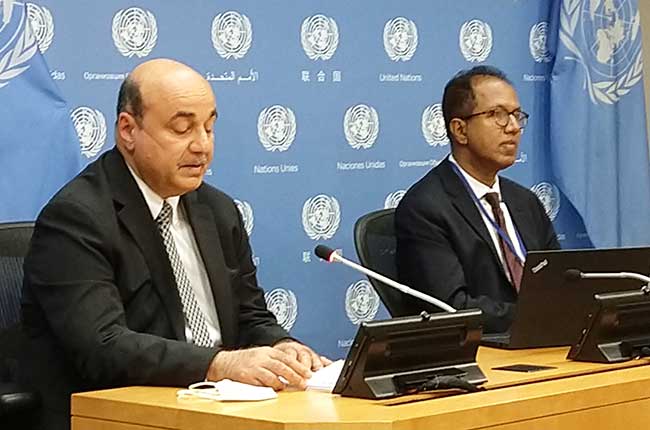The UN said on Tuesday that "with many positives", India's economic growth this year is expected to hold at 5.8 per cent, affirming a series of international organisations' projections that the country will be the fastest-growing major economy.
The Midyear Update to the UN's World Economic Situation and Prospects report projected next year's gross domestic Product (GDP) to hold at 6.7 per cent "supported by resilient domestic demand".
Speaking at the release of the report, the chief of the UN's Global Economic Monitoring Branch, Hamid Rashid, said that India continues to be "the bright spot" in the world economy with "many positives, including [that] the inflation has come down significantly" to about 5.5 per cent.
"This means that there'll be significant room for both fiscal expansion and monetary accommodation, so that will support domestic demand," he said.
However, he said that there were external risks.
If the external financing conditioning deteriorates further and becomes much tighter, Rashid said, India would face some challenges, especially for exports.
As for India reaching even higher growth rates, he said it is "subject to quite a bit of uncertainty, especially in the external environment".
But he added, "We are pretty confident with our forecast right now for the year."
The report said that "financial conditions in the emerging economies with good credit ratings have generally remained relatively stable".
The International Monetary Fund (IMF) had last month projected India's GDP to grow at 5.9 per cent in the current fiscal while the World Bank (WB) pegged it at 6.3 per cent and the Asian Development Bank at 6.4 per cent, which are closer to India's Reserve Bank's 6.5 per cent.
But both the bigger international institutions cut the projections marginally from the earlier one - IMF by 0.2 per cent and the WB by 0.3 per cent.
The latest UN report cut the overall growth projects by 0.1 per cent for all of South Asia to 4.7 per cent this year and 5.8 per cent next year.
Inflation for the region as a whole is projected by the UN to be 11 per cent, 1.9 per cent lower than last year, it said.
The inflation rates for Pakistan and Sri Lanka are expected to be in the "double digits" due to the weakening of local currencies.
But India's inflation deceleration to 5.5 per cent would be the result as "global commodity prices moderate and slower currency appreciation reduces imported inflation", it said.
The report saw a sliver of silver lining in the global economy's growth prospects this year with an increase of 0.4 per cent from the January projection to 2.3 per cent, although the director of the Economic Analysis and Policy Division, Shantanu Mukherjee, warned that a "sombre" picture still holds.
He said that despite the increase, it is still below the average growth of 3.1 per cent in the two decades before the Covid pandemic and there is a risk of prolonged low growth.
The report projected global growth to increase to 2.5 per cent.
The global picture is buoyed in part by the increase in projections for the three largest economies in the world, the United States, the European Union and China, according to the report.
China, which is the second fastest-growing economy, had its growth prospects raised from January by 0.5 per cent to 5.3 per cent following the lifting of the Covid restrictions which led to a recovery of consumer spending and investments, the report said.
The report's US growth projection was increased by 0.7 per cent to 1.1 per cent, and the European Union's by 0.7 per cent to 0.9 per cent.
The report said that capital flows to developing countries "recovered, albeit with significant volatility, reversing the decline in the first half of 2022".
"Global financial markets have remained largely resilient despite the ongoing banking turmoil in the United States and Europe," it said.
Although the regulators managed to contain the turmoil of the collapse of the Silicon Valley Bank and the Signature Bank and the government seizure of the First Republic Bank for sale to JPMorgan Chase in the US and the Swiss government-brokered takeover of Credit Suisse by UBS, the report said that the developments showed "the potential of more systematic financial stability risks".




Tripura CM stresses promoting NE states' potential to attract investment
Tripura Chief Minister Manik Saha on Wednesday said that the development of the communication process and system has generated a lot of investment potential, and therefore, more emphasis should be placed on promotion to attract investors in all the northeastern states.
Tripura has 94,723 Lakhpati Didis; 93,425 women to get similar status soon: Minister
Among the 4,75,582 Self Help Group (SHGs) members in Tripura, 94,723 women emerged as ‘Lakhpati Didis’ through their engagement in various enterprising units and 93,425 more women would be ‘Lakhpati Didis’ soon, Social Welfare and Labour Minister Tinku Roy said.
Bhavan’s Little Learners celebrate annual programme
The Bhavan’s Little Learners, Bordowali celebrated annual programme and organised prize distribution ceremony here at Agartala Rabindra Satabarshiki Bhavan on Wednesday.
Govt working to boost agricultural production to make Tripura self-reliant: Minister Ratan Lal Nath
The Tripura government is contemplating to make Tripura self-reliant in agricultural production, said agriculture minister Ratan Lal Nath on Wednesday.
Scholarship Fraud: Tribal Welfare Dept issues show cause to 34 students
In a major crackdown on scholarship fraud, the Tripura Tribal Welfare Department has issued show cause notices to 34 students for allegedly submitting fake income certificates to avail the Scheduled Tribe (ST) Post-Matric Scholarship for the academic year 2023-24.
Fall of Congress in Gujarat: Three decades of decline and struggle for relevance
The Congress party was once the dominant political force in Gujarat, shaping the state’s governance since independence. However, over the past 30 years, the party has witnessed a dramatic downfall, losing ground to the BJP’s aggressive electoral strategies, organisational strength, and ideological appeal.
‘Disempowering Muslims’: J&K political parties oppose Waqf (Amendment) Bill
All political parties of J&K, except the BJP, opposed the Waqf (Amendment) Bill, saying that the Bill is intended to disempower Muslims and only target one religion.
Radical group founder wanted in Jaipur serial blast plot apprehended in Ratlam
The Madhya Pradesh Police in Ratlam achieved a significant breakthrough in apprehending Firoz, also known as Sabji, a fugitive implicated in a conspiracy to execute serial blasts aimed at creating panic and terrorising the Rajasthan capital city of Jaipur.